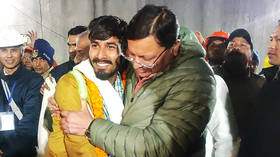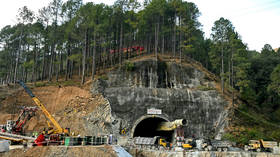All 41 men rescued from Indian tunnel after 17 days

All 41 construction workers who had been trapped in a 4.5km tunnel for more than two weeks in India were finally evacuated on Tuesday night.
The men were pulled out on wheeled stretchers one by one through a large pipe that rescuers in the northern state of Uttarakhand had pushed through debris and rocks.
Medical teams had been on standby for days to assess the condition of the men once they were rescued, and transport them to the nearby hospitals without delay. According to media reports, the roads adjacent to the entrance of the blocked tunnel had to be quickly repaired, having become uneven due to the regular movement of heavy vehicles in the vicinity in recent days.
Medical experts at the site said the workers would need long-term support and monitoring for post-traumatic stress disorder (PTSD), reports noted. “All 41 would experience some post-traumatic symptoms like insomnia, recurrent bad dreams, recurrent reliving of the tunnel collapse, anxiety,” Dr. Dinakaran D of the state-run National Institute of Mental Health and Neuro Sciences told Al Jazeera.
The rescue operation hit several snags due to the nature of the Himalayan terrain and equipment failure, which prolonged the rescue. Initially, excavators sought to dig horizontally through the debris, awaiting the delivery of a wide steel pipe that would serve as a passageway for the workers to exit the tunnel. However, large rocks blocked the process. Loose debris, boulders, cement blocks, and iron rods inside the tunnel further delayed the mission.
⚡️First Images of Uttarakhand Rescue Operation - 34 Workers Emerge from TunnelRT's correspondent on the ground @Runjhunsharmas confirms at least 34 have been brought safely out so far.📹: @pushkardhami#UttarakhandRescuepic.twitter.com/6DRjCTOwxt
— RT_India (@RT_India_news) November 28, 2023
During the rescue operation, even the most sophisticated drilling machines failed multiple times, prompting government agencies to involve ‘rat miners’ – workers who use a primitive method of coal extraction – to drill by hand through the debris at the last stage of the mission. These miners, brought in from central Indian states, are experts at reaching coal deposits through narrow passages using hazardous methods.
Billionaire Indian industrialist Anand Mahindra noted that after all the sophisticated drilling equipment had failed, it was the “humble” rathole miners who had made the vital breakthrough. “It’s a heartwarming reminder that at the end of the day, heroism is most often a case of individual effort and sacrifice,” he noted on X (formerly Twitter).
Around 60 disaster management officials, 80 policemen, and 20 fire services officials were engaged in the rescue efforts. International experts, including Arnold Dix, a tunneling expert from Australia, were also flown in for the mission.
As the end of the mission drew nearer, the family members of the workers, who were waiting expectantly outside the tunnel, began celebrating. Despite the hurdles in the drilling process causing delays, those family members, as well as a team of doctors and psychiatrists, remained dedicated to keeping the trapped workers motivated.
The workers became trapped on November 12, the day India was celebrating its biggest religious festival, Diwali, when a portion of the tunnel they were working on collapsed due to a landslide. They were unhurt and government agencies were able to establish contact with them through walkie-talkies within a few hours. Since then, the men have been getting food and other supplies through steel pipes.
The tunnel is a part of India’s ambitious $1.5 billion Char Dham highway project, which links Hindu pilgrimage sites in Uttarakhand through an 890km network of roads. Last week, Reuters reported, citing unnamed sources, that a panel of experts investigating the disaster had said the tunnel did not have an emergency exit and may have been built through a geological fault known as a “shear zone,” which could have caused the collapse.
Where India Meets Russia – We are now on WhatsApp! Follow and share RT India in English and in Hindi













